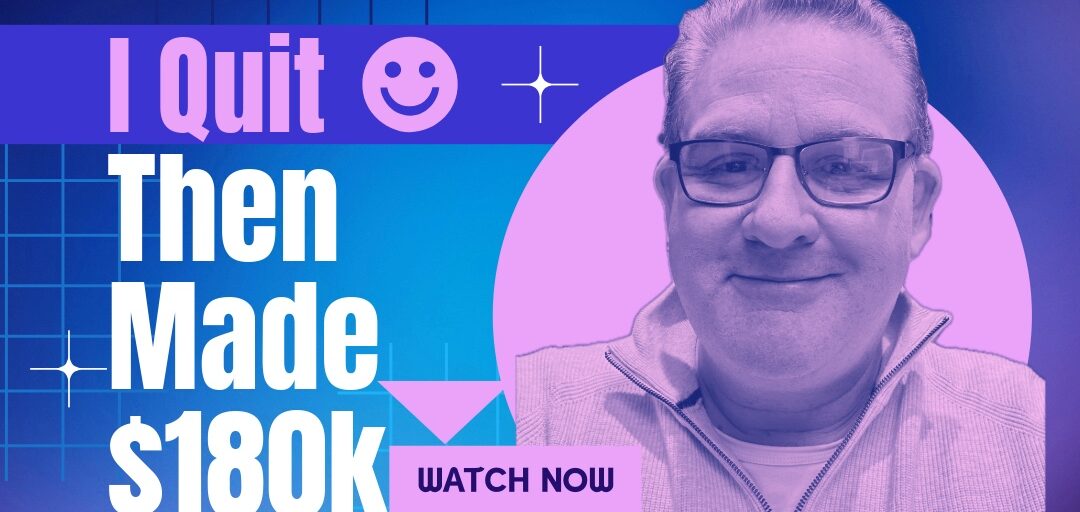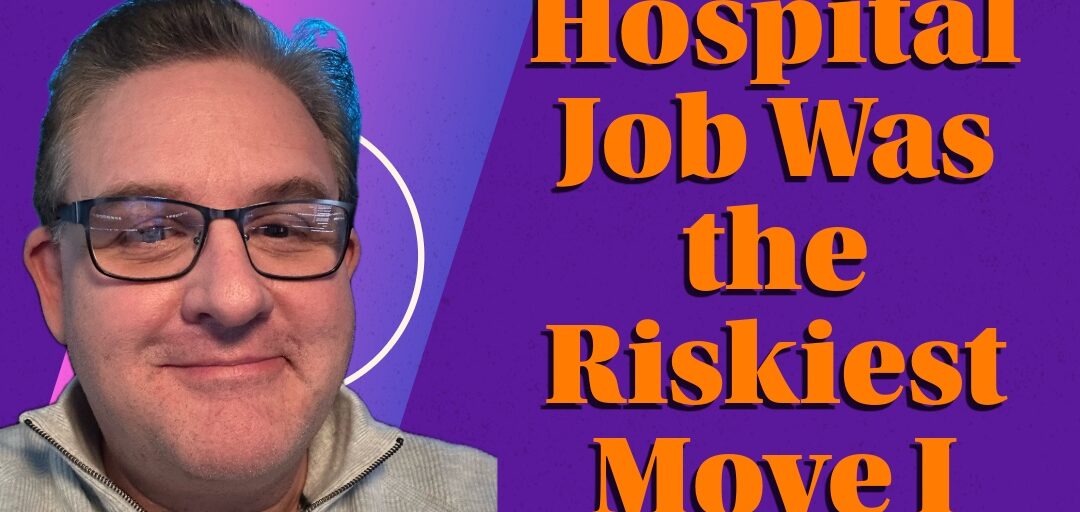From Employment Fear to $15K First Month: Healthcare Freelance Success Story
Written by Rod on September 29, 2025
The world of healthcare freelance consulting opened doors I never knew existed when I made the leap from traditional employment. What started as my biggest fear—getting paid as an independent healthcare consultant—became the foundation of financial freedom that exceeded anything traditional healthcare roles could offer. In my first month of healthcare freelance consulting, I earned $15,000, proving that clinical expertise commands premium rates when properly positioned in the marketplace. This transformation from employment anxiety to consulting success reveals why healthcare professionals who understand both patient care and technology implementation are among the most sought-after consultants in today’s digital health landscape.
The Fear That Almost Kept Me Trapped
Like most clinical professionals, I’d been conditioned to believe that employment equals security. The narrative goes like this: healthcare organizations provide steady paychecks, benefits, and professional legitimacy. Freelancing is risky, unstable, and definitely notsomething “serious” healthcare professionals do.
I was terrified of three specific scenarios:
The Non-Payment Nightmare: Clients refusing to pay invoices, leaving me financially stranded with no recourse.
The Feast-or-Famine Cycle: Making good money one month, then having no income for the next three months.
The Credibility Crisis: Being seen as a “failed” healthcare professional who couldn’t maintain “real” employment.
Every single fear turned out to be completely wrong.
The $15K Reality Check
My first freelance project was helping a healthcare technology company understand clinical workflows for their AI implementation platform. The scope was straightforward: conduct workflow analysis, interview clinical staff, and provide recommendations for optimizing their technology to serve real patient care needs.
The Timeline: 30 days of work, including site visits, staff interviews, and comprehensive reporting.
The Rate: $150 per hour for consulting time, plus project fees for deliverables.
The Hours: Approximately 80 hours of billable work in the first month.
The Math: $150 × 80 hours = $12,000 + $3,000 in project fees = $15,000 total.
When I sent that first invoice, I was genuinely nervous. I’d never asked anyone for $15,000 before. The traditional healthcare mindset told me this was somehow inappropriate or unrealistic.
The Payment Reality: The invoice was paid within 15 days, exactly as contracted. No drama, no negotiations, no payment issues whatsoever.
Why Getting Paid Is Easier Than You Think
The healthcare industry operates on different financial principles than traditional clinical employment suggests. When you’re providing genuine value to healthcare organizations, payment isn’t a favor—it’s a business necessity.
Healthcare Organizations Need Expertise: Hospitals and health systems are desperately seeking clinical professionals who understand both patient care and technology implementation. When you solve real problems, organizations are eager to pay for results.
Contractual Clarity: Unlike employment where your value is obscured by salary structures, freelancing makes your worth transparent. Clear contracts specify deliverables, timelines, and payment terms that protect both parties.
Business-to-Business Transactions: Healthcare organizations treat consultant payments as business expenses, not personal favors. Finance departments have established processes for vendor payments that work efficiently when properly structured.
Premium for Specialized Knowledge: The combination of clinical expertise and technology understanding commands premium rates because so few professionals have both skill sets.
The Year and a Half That Followed
That first $15K month wasn’t a fluke—it was the beginning of consistent, sustainable freelance income that eventually exceeded anything traditional healthcare employment could offer.
Month 2-3: Secured two additional projects through referrals from the first client, earning $22,000 combined.
Month 4-6: Expanded into training and change management consulting, adding recurring revenue streams worth $8,000-$12,000 monthly.
Month 7-12: Developed specialty expertise in AI implementation, commanding higher rates ($200-$250 per hour) while working fewer total hours.
Year Two Begin: Transitioned from project-based work to retainer agreements with healthcare organizations, creating predictable monthly income of $15,000-$25,000.
The Financial Transformation: In 18 months, I earned more than I had in the previous three years of traditional healthcare employment, while working fewer hours and having complete schedule autonomy.
The Mindset Shift That Changes Everything
The transition from employment thinking to entrepreneurial thinking requires fundamental mindset changes:
From Time to Value: Employment teaches you to trade time for money at predetermined rates. Freelancing rewards you for delivering value, regardless of time invested. A two-hour consultation that prevents a million-dollar implementation failure is worth far more than two hours of bedside nursing.
From Security to Opportunity: Employment feels secure because income is predictable, but it’s actually limiting because advancement is constrained by organizational structures. Freelancing feels risky because income varies, but it’s actually more secure because success depends on your skills rather than your employer’s financial stability.
From Permission to Initiative: Employment requires approval for professional development, schedule changes, and project participation. Freelancing rewards initiative, creativity, and the ability to identify opportunities before others see them.
From Scarcity to Abundance: Healthcare employment operates on scarcity principles—limited positions, competitive advancement, constrained budgets. Healthcare consulting operates on abundance principles—unlimited opportunities for professionals who solve real problems.
The Skills That Command Premium Rates
My $15K first month didn’t happen because I was lucky—it happened because I’d developed skills that healthcare organizations desperately needed:
Clinical Workflow Expertise: Understanding how healthcare actually operates daily, not how it’s supposed to work according to policy manuals.
Technology Translation: Bridging the gap between what technology vendors promise and what clinical staff actually need.
Change Management: Helping healthcare organizations implement new systems without disrupting patient care or staff satisfaction.
Regulatory Knowledge: Understanding compliance requirements, safety standards, and quality metrics that technology implementations must address.
Communication Skills: Translating complex technical concepts for clinical audiences and explaining clinical needs to technology teams.
The Payment Systems That Actually Work
Getting paid as a healthcare freelancer is straightforward when you understand business processes:
Clear Contracts: Specify deliverables, timelines, payment terms, and scope boundaries. Healthcare organizations respect professionals who establish clear business relationships.
Invoice Promptly: Send invoices immediately upon completing deliverables or reaching monthly billing cycles. Don’t wait—prompt invoicing demonstrates professionalism.
Follow Standard Terms: Net 30 payment terms are standard in healthcare business transactions. Some organizations pay faster, but 30 days is reasonable and expected.
Use Professional Systems: Invoice through professional platforms (FreshBooks, QuickBooks, Wave) that provide payment tracking, automatic reminders, and audit trails.
Maintain Records: Keep detailed records of all work performed, communications, and deliverables. This documentation protects both your interests and your clients’.
The Relationship Factor
Perhaps the most surprising discovery about freelance success was how much it improved my personal relationships:
Financial Stress Reduction: Earning $15K in my first month eliminated the constant financial anxiety that had characterized my traditional healthcare employment. When money stops being a source of stress, relationships improve dramatically.
Schedule Autonomy: Controlling my own schedule meant I could prioritize family events, personal commitments, and relationship building without requesting permission or negotiating with supervisors.
Professional Confidence: Success as an independent consultant created confidence that spilled over into personal relationships. When you’re valued for your expertise, you approach all relationships from a position of strength rather than insecurity.
Energy Conservation: Freelance projects that align with your interests and expertise are energizing rather than draining. I came home from consulting work excited about what I’d accomplished rather than depleted by bureaucratic frustrations.
The Sustainable Income Reality
The most important lesson from my freelance journey is that sustainable income comes from developing genuinely valuable skills, not from finding clients willing to overpay for basic services.
Expertise Development: Continuously improving your knowledge of healthcare technology, regulatory changes, and industry trends ensures that your consulting remains valuable over time.
Relationship Investment: Satisfied clients become sources of referrals, repeat business, and professional recommendations. Investing in client success creates long-term income security.
Service Evolution: Successful freelancers evolve their services based on market needs. My consulting evolved from basic workflow analysis to comprehensive AI implementation strategies as the industry matured.
Portfolio Approach: Diversifying services across multiple healthcare organizations reduces financial risk while providing insights into industry-wide trends and opportunities.
The Fear-to-Freedom Transformation
My journey from employment fear to freelance freedom revealed that most barriers to financial independence in healthcare are psychological rather than practical:
Fear of Rejection: Clients want solutions to real problems. When you can solve genuine healthcare challenges, organizations are eager to hire you.
Fear of Instability: Freelance income becomes more stable than employment income once you establish expertise and relationships in high-demand areas.
Fear of Professional Isolation: The healthcare consulting community is collaborative and supportive. Independent professionals often have stronger professional networks than traditional employees.
Fear of Administrative Burden: Modern business tools make invoicing, contract management, and tax compliance straightforward for individual consultants.
Your Freelance Financial Strategy
Ready to discover what your clinical expertise is actually worth? Here’s your strategic roadmap:
Phase 1: Foundation Building (Months 1-3)
• Identify specific problems you can solve for healthcare organizations
• Develop a portfolio demonstrating your expertise and results
• Establish professional presence through writing, speaking, or networking
• Research market rates for your particular skills and experience level
Phase 2: First Project Success (Months 3-6)
• Target organizations facing challenges that match your expertise
• Propose pilot projects that demonstrate value with limited initial commitment
• Deliver exceptional results that exceed client expectations
• Document success metrics and client testimonials
Phase 3: Income Scaling (Months 6-18)
• Leverage first project success to secure additional opportunities
• Develop recurring revenue streams through retainer agreements
• Increase rates based on proven results and growing expertise
• Build referral networks that generate consistent new opportunities
The Choice That Changes Everything
You can continue accepting traditional healthcare compensation that undervalues your expertise while limiting your financial potential. Or you can discover what your clinical knowledge is actually worth in the marketplace.
My $15K first month wasn’t the ceiling—it was the foundation for financial freedom that traditional healthcare employment could never provide. The fears that almost kept me trapped in employment were completely unfounded.
The Reality: Healthcare organizations will pay premium rates for clinical professionals who solve real problems. Getting paid isn’t difficult when you deliver genuine value.
The Opportunity: Your clinical expertise is more valuable than you realize, and the market for healthcare consulting continues to expand as technology adoption accelerates.
The Choice: Continue trading time for predetermined wages, or discover what your knowledge and skills can earn when properly valued.
Your clinical expertise has been undervalued by traditional employment structures. The freelance marketplace recognizes what healthcare organizations actually need—and they’re willing to pay accordingly.
Are you ready to discover what your first $15K month could look like? The opportunity is waiting for clinical professionals who understand that their expertise has value far beyond traditional employment suggests.
References
[1] Healthcare Consulting Market Trends. Healthcare Financial Management Association. https://www.hfma.org/consulting-market-trends
[2] Freelance Income Statistics in Healthcare. Independent Healthcare Professionals Association. https://ihpa.org/freelance-income-data
[3] Payment Best Practices for Healthcare Consultants. Healthcare Business Solutions. https://hbs.org/consultant-payment-guide
[4] Building Sustainable Consulting Practices in Healthcare. Journal of Healthcare Management. https://jhm.org/sustainable-consulting
[5] Financial Independence for Healthcare Professionals. Healthcare Financial Freedom Institute. https://hffi.org/financial-independence-guide




